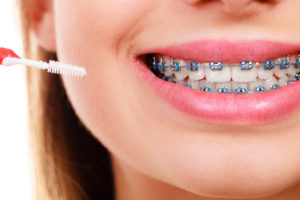By: Dr. Elizabeth Eggert

We urge everyone to practice good oral hygiene habits so they can have a life-long healthy, attractive smile. If you’ve got braces, it’s especially important, and just a little trickier than it is for the unbraced.
Greater Risks with Braces
It’s especially crucial because poor care and hygiene could cause problems leading to prolonged treatment. If you want the braces chapter of your life to come to a timely conclusion, take extra good care of your teeth to avoid risk of tooth decay, gum disease or simply undesirable coloration.
Plaque and bacteria are on a mission to stick to the surfaces of your teeth and spread. Also, stains from coffee, tea, wine and other foods can discolor your enamel, and when the braces come off, they may reveal whiter squares where the brackets were attached.
Long-Term Benefits of Braces
Braces are a long-term commitment with a great payoff: Not only are well-aligned teeth more attractive, they also avoid unnecessary wear, and they’re easier to keep clean, preventing decay and cavities.
Here are our tips for making sure that when the long-anticipated unveiling takes place, your teeth look their best–and there are no unpleasant surprises.
Brush After Every Meal and Before Bed
Brushing is the number-one defense against problems. Use a soft-bristled toothbrush, an electric toothbrush, or a high-tech one like Sonicare. Inspect your bristles regularly–they’ll wear out faster than without braces, so replace your brush regularly.
Develop good brushing habits, the same as we recommend for folks without braces. Brush for two minutes each session, and develop a routine so you give equal attention to each quarter of your mouth: top and bottom, left and right. Use a smooth, circular motion when you brush, and adjust the angle to get past your hardware. Don’t press too hard or saw back and forth. Remember to brush both sides of the bracket!
Interdental Brush
 Use these miniature bottle brushes to tackle gaps or spaces between teeth, and to gently clean around and underneath your braces and wires where your brush isn’t making contact. Again, be systematic: start at one end and go all the way to the other, moving the brush between each set of brackets.
Use these miniature bottle brushes to tackle gaps or spaces between teeth, and to gently clean around and underneath your braces and wires where your brush isn’t making contact. Again, be systematic: start at one end and go all the way to the other, moving the brush between each set of brackets.
Floss with a Threader Once Daily
While you’re wearing braces, a floss threader is essential. It’s just like a plastic needle and thread. It allows you to slip the floss between your teeth and address plaque at the gum line. Follow a pattern, making sure you hit every gap: top to bottom, left to right, whatever works for you. Be gentle on your gums, and don’t saw back and forth–use an up-and-down motion.
Rinse Your Mouth
Take a good mouthful of water and swish it around to dislodge any remaining debris. For an extra level of care, use an extra strength, prescription fluoride toothpaste, or minimally an over the counter fluoride rinse.
Check a Mirror
Simple — make sure you’ve gotten rid of all visible particles and don’t forget to check under your lips!.
Keeping Braces Clean is a Little Extra Work, but Worth it
Getting braces requires an extra commitment to oral hygiene, but it only takes a few minutes a day to ensure that you’re taking the best possible care of your mouth. Because you’ll probably be brushing more frequently than you did previously, put together a kit with your essentials, so you can brush on the go. Toothbrush, toothpaste, interdental brush, mirror and floss don’t take up much space, and will ensure that you don’t walk around with any embarrassing bits of food clinging to your braces.
We hope these tips reassure you that it’s easy to take great care of your teeth, with or without braces. The good oral habits you develop now will continue to serve you long after the braces are off. If you have any questions, the team at Eggert Family Dentistry is happy to help you out.